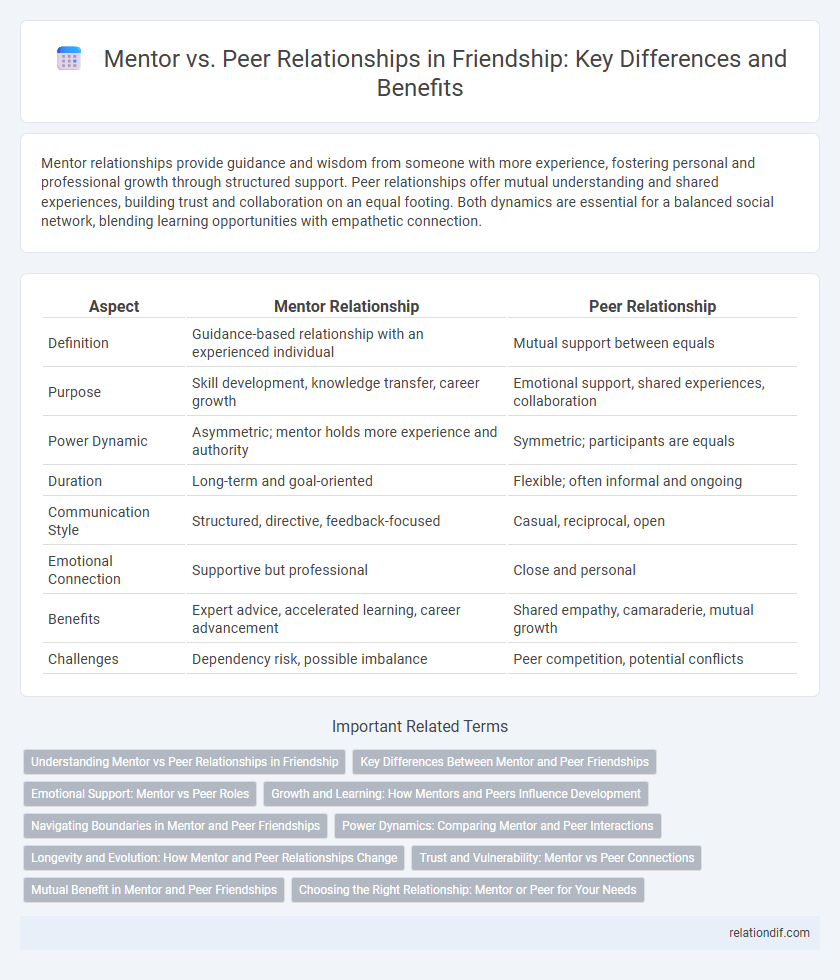Mentor relationships provide guidance and wisdom from someone with more experience, fostering personal and professional growth through structured support. Peer relationships offer mutual understanding and shared experiences, building trust and collaboration on an equal footing. Both dynamics are essential for a balanced social network, blending learning opportunities with empathetic connection.
Table of Comparison
| Aspect | Mentor Relationship | Peer Relationship |
|---|---|---|
| Definition | Guidance-based relationship with an experienced individual | Mutual support between equals |
| Purpose | Skill development, knowledge transfer, career growth | Emotional support, shared experiences, collaboration |
| Power Dynamic | Asymmetric; mentor holds more experience and authority | Symmetric; participants are equals |
| Duration | Long-term and goal-oriented | Flexible; often informal and ongoing |
| Communication Style | Structured, directive, feedback-focused | Casual, reciprocal, open |
| Emotional Connection | Supportive but professional | Close and personal |
| Benefits | Expert advice, accelerated learning, career advancement | Shared empathy, camaraderie, mutual growth |
| Challenges | Dependency risk, possible imbalance | Peer competition, potential conflicts |
Understanding Mentor vs Peer Relationships in Friendship
Mentor relationships in friendship often involve guidance, experience sharing, and support from a more knowledgeable individual, fostering personal growth and development. Peer relationships emphasize mutual understanding, equality, and shared experiences, creating a sense of camaraderie and reciprocal support. Recognizing the unique functions, communication styles, and emotional dynamics in mentor versus peer friendships enhances the depth and quality of social connections.
Key Differences Between Mentor and Peer Friendships
Mentor relationships emphasize guidance, expertise, and long-term personal or professional growth, while peer friendships center on mutual support, shared experiences, and equality. Mentors provide constructive feedback and strategic advice, contrasting with peers who offer empathy and camaraderie based on common interests. The power dynamic in mentor relationships tends to be hierarchical, whereas peer friendships are characterized by reciprocal influence and emotional connection.
Emotional Support: Mentor vs Peer Roles
Mentor relationships provide structured emotional support through guidance based on experience and wisdom, helping mentees navigate personal and professional challenges with insightful advice. Peer relationships offer emotional support through shared experiences and mutual understanding, fostering empathy and validation from equals. Both roles are essential, as mentors contribute perspective and stability, while peers promote reciprocity and emotional connection.
Growth and Learning: How Mentors and Peers Influence Development
Mentor relationships provide structured guidance and expertise, accelerating personal and professional growth through targeted feedback and experienced insights. Peer relationships facilitate collaborative learning and emotional support, fostering development through shared experiences and mutual challenge. Both relationships complement each other by balancing expert advice with relatable, real-time interaction, maximizing overall growth and learning opportunities.
Navigating Boundaries in Mentor and Peer Friendships
Navigating boundaries in mentor and peer friendships requires clear communication and role awareness to maintain trust and respect. Mentor relationships often involve guidance and authority, necessitating professional limits to avoid conflicts of interest. Peer friendships thrive on equality and mutual support, but setting personal boundaries remains essential to prevent misunderstandings.
Power Dynamics: Comparing Mentor and Peer Interactions
Mentor relationships involve a clear power dynamic where the mentor provides guidance, expertise, and authority, shaping the mentee's growth and learning trajectory. Peer relationships, by contrast, are characterized by mutual support and equality, fostering collaborative problem-solving without hierarchical influence. Understanding these distinct power dynamics helps optimize communication and development strategies in personal and professional friendships.
Longevity and Evolution: How Mentor and Peer Relationships Change
Mentor relationships often evolve over extended periods, deepening as mentees gain experience and seek advanced guidance, resulting in sustained influence and personal growth. Peer relationships tend to be more dynamic, shaped by mutual support and shared experiences, but may fluctuate with life changes and shifting interests. Both types of relationships contribute uniquely to emotional resilience and professional development through their differing longevity and evolution.
Trust and Vulnerability: Mentor vs Peer Connections
Mentor relationships build trust through experienced guidance and a safe space for vulnerability, fostering growth and confidence in mentees. Peer relationships thrive on mutual trust and shared experiences, enabling open vulnerability and emotional support among equals. Both connections enhance personal development but differ in trust dynamics and the depth of vulnerability shared.
Mutual Benefit in Mentor and Peer Friendships
Mentor relationships foster mutual benefit through knowledge transfer, skill development, and personal growth, creating a dynamic where experience guides progress. Peer friendships promote mutual benefit by offering emotional support, shared experiences, and collaborative problem-solving, enhancing social connection and empathy. Both mentor and peer relationships contribute to well-rounded personal development through reciprocal engagement and trust.
Choosing the Right Relationship: Mentor or Peer for Your Needs
Choosing the right relationship depends on your personal growth goals and current challenges. A mentor offers experienced guidance, industry insights, and long-term development support, ideal for career advancement and skill mastery. Peer relationships provide mutual support, shared experiences, and collaborative problem-solving, making them valuable for emotional encouragement and daily motivation.
Mentor relationship vs Peer relationship Infographic

 relationdif.com
relationdif.com